Destination: Peru

Small group escorted tours to Peru. Places of interest for like minded travellers who are curious.
Related Tours
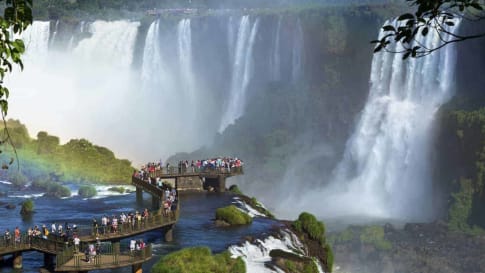
25 days
Sep, May, AprSouth American Small Group History and Culture Tour
Visiting Argentina, Bolivia
Experience the jewels of South America on this in-depth itinerary featuring the dramatic contrasts of this great continent on a small group tour for senior couples and solo travellers. Journey through Chile, Peru, Bolivia, Argentina and Brazil. Marvel at the ancient cultures and natural wonders of the Amazon, the snow-capped peaks of the Andes mountains, the calm waters of Lake Titicaca and the jewel coloured beaches of Rio.
From A$22,795 AUD
View Tour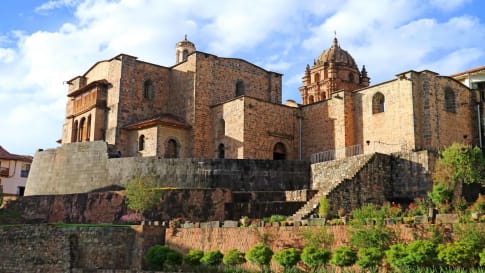
22 days
Apr, MarEcuador and Peru Archaeology tour
Visiting Ecuador, Peru
This 22-day small group tour highlights the most prominent ancient ruins and archaeological finds across Ecuador and Peru and showcases the vast culture and impact of pre- and post-Inca civilization.
From A$16,750 AUD
View TourTouring Peru
The need to know
Getting around
Odyssey travels by coach and occasionally uses local transport, including trains and ferries. Specifics are always outlined in your tour itinerary. Peru Rail runs train services to major tourist spots Cusco and Macchu Pichu, although services to other areas in the country may be limited. Bus services criss-cross the country and are generally inexpensive, although the conditions of different model buses can vary considerably.
Accommodation
In major cities, Odyssey stays in centrally located 3-4 star hotels, with easy access to public transport. In smaller towns or rural areas, we usually stay in family-run hotels or guesthouses. On our longstay tours, during which you spend the length of the tour in a single location, we use serviced apartments.
Tour guides
Odyssey always engages local guides with regional knowledge to ensure an authentic experience during which you can learn as much as possible about the history and culture of places you visit.
Geography, Environment, & Weather
Peru covers a total area of 1,285,216 square kilometres and has a coastline of 2,414 kilometres. There are three main geographical zones in Peru – the arid Costa region in the west, the mountainous Sierra in the centre, and the tropical Amazonia region to the east. The Andes Mountains in the Sierra region cover almost 40% of Peru’s surface area,
The climate in Peru varies from region to region, from the dry and arid climate of the coast, to the cold climactic conditions of the mountains, and the wet and humid climate of the Amazonia region. Depending on when and where you intend to travel, check the weather reports and dress accordingly.
World heritage sites
There are 12 properties in Peru listed on the World Heritage List. You can view the listed properties here: (https://whc.unesco.org/en/statesparties/pe). Peru’s listed properties include:
Chan Chan Archaeological Zone, the site of what was the largest pre-Columbian city in South America
Qhapaq Ñan (Andean Road System), the intricate ancient road system that once spanned the length of the former Incan empire
Manú National Park, which covers an area of 1.5 million hectares and holds some 850 species of bird species.
Festivals & Events
Contemporary Peruvian culture is a rich syncretic mix of both Spanish and pre-Columbian native influences, with many festivals and events showcasing the country’s unique cultural traditions. Catholicism is deeply rooted in Peruvian society, with many religious occasions dotting the calendar – notable examples include Fiesta de las Cruces, which features parades of elaborately decorated crucifixes, and Día de Santa Rosa de Lima, which celebrates the canonisation of Santa Rosa de Lima, the first-native-born American saint canonised by the Catholic Church. Native traditions live on through events such as Inti Raymi, which is held on the winter celebration, and is held in honour of the Incan sun god (‘Inti’). Other notable events include the Mistura Culinary Festival and the Fiesta de la Vendimia (‘The Wine Festival’).
Reading list
Lost City of the Incas: The Story of Machu Picchu and Its Builders, by Hiram Bingham III
The Ancient Kingdoms of Peru, by Nigel Davies
The Last Days of the Incas, by Kim MacQuarrie
Peru: Elite Power and Political Capture, by John Crabtree and Francisco Durand.
Eating & Drinking
Peruvian food is a fusion of native ingredients and foreign culinary influences. The main staples of Peruvian cuisine are corn, potatoes, quinoa and legumes, while rice and meat also heavily feature in Peruvian diets. Like elsewhere on the South American Pacific coast, ceviche (a stew made from seafood and citrus juices) is immensely popular, and can be found in restaurants all over the Peruvian coast. Potatoes are an important source of sustenance in Peru, and is a key ingredient in many dishes, including causa (potato casserole) and papas a la huancaina (potatoes in spicy cheese sauce). The multicultural nature of Peru shines through in dishes such as lomo saltado, a dish created by Chinese immigrants and made out of steak, red onions, chilli and hot chips.
Pisco Sour, an alcoholic drink made from pisco (brandy), lime juice, syrup, and bitters, is the national drink of Peru. It is held in such high regard in the country that a national holiday is held in its honour, National Pisco Sour Day. Other popular beverages include chica morada (a non-alcoholic drink made from boiling purple corn with pineapple skin, cinnamon, cloves, and sugar) and chica de jora (a type of beer made from jora corn).
Health & Safety
As of writing, smartraveller.gov.au advises travellers to exercise a high degree of caution when travelling through Peru. Crime is a significant problem in some of Peru’s major cities, so keep your valaubles close and pay attention to your personal security. Also, it is advised to avoid hailing taxis in the streets, and only booking taxis from a hotel or restaurant, or via a secure app.
Electrical Supply
Whenever you travel overseas, it’s always wise to take an appropriate travel adaptor. The electricity supply in Peru runs at 220V and 60Hz. Peru uses the Type A and Type C electric plug types, so make sure you have the right travel adaptor with you.
Highlights
The best of Peru
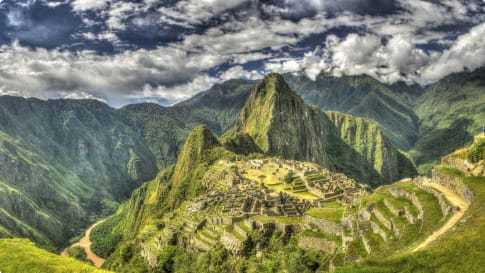
Machu Picchu
Machu Picchu, the iconic mountaintop citadel perched amidst the Eastern Cordillera mountains.
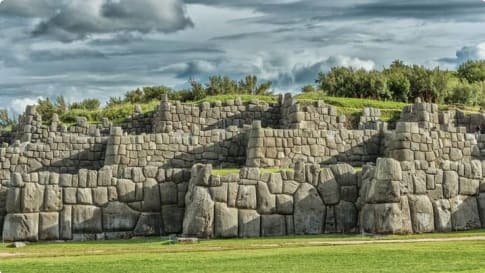
Sacsayhuaman
Sacsayhuaman, the imposing fortified complex that once stood as a potent symbol of the powerful Incan empire.
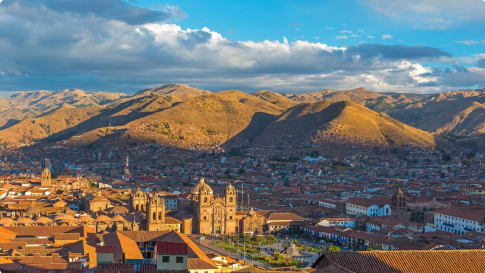
Cusco Cathedral
Cusco Cathedral, the stunning Catholic catherdral located in the heart of Cusco.
Tour Reviews
FAQs
What is the time zone?
Peru has a single time zone, Peru Standard Time (UTC-5). Daylight savings are not observed in Peru.
Is tipping customary in Peru?
If you’re on an Odyssey tour, we take care of tipping so you don’t need to give it a second thought. However, in your free time, or if travelling independently, it’s essential that you tip an appropriate amount for services. Tipping is appreciated in Peru, with small tips for hotel staff, tour guides, and servers in upscale restaurants. In restaurants, a tip of around 10% is customary.
What is the internet access like in Peru?
Wifi should be freely accessible in most hotels, cafes and restaurants in urban areas, though connection speeds can vary, particularly in more isolated areas.
Can I use my mobile/cell phone while in Peru?
Check with your cell phone provider to see whether you’re able to make calls and use data while in Peru. Many providers will allow you to pay a daily fee that allows you to make calls and check the internet while only being charged your regular rates. However, be certain to inform your provider that you’re heading overseas, because just like a bank they can turn off your service as a result of unusual activity.
Responsible travel tips for Peru
- Learn at least the local greetings to break the ice. Although some locals speak English, the more you know of the native language, the greater your experience of the country will be.
- Carry a business card in your wallet or purse from your local hotel, to assist you with the return journey if you do become lost.
- Always ensure that you are covered by travel insurance. If you need advice on this feel free to contact Odyssey and we’ll be able to help.
- Before departing, make sure you have a number of soles in a range of denominations. You don’t want to be carrying around enormous amounts of cash, but take enough to make it easy to pay in locations that might not accept credit card. It will also help you avoid card transaction fees, and it makes tipping a breeze.
- When travelling independently, make sure you check the opening hours of shops and museums so that you don’t miss out! Also be certain to check whether your trip coincides with any public holidays, so you can plan accordingly.
- Before departing on your trip, contact your bank to inform them that you may be making purchases overseas. Otherwise, they may flag any activity on your account as suspicious. Also, check which ATMs and banks are compatible with your cards, to ensure you can withdraw cash with minimal fees.
